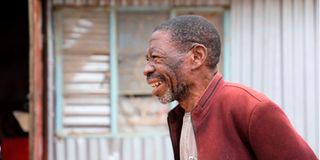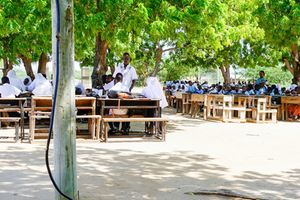Beyond the norm: Kajiado great-grandpa relishing new parenting role

Soweremu Hamisi. At 68, instead of resting, he became a parent for the third time.
For Soweremu Hamisi, his life journey took an unplanned detour when he became a parent to one of his great-grandchildren.
At 68, instead of resting, he became a parent for the third time. His children experienced difficulties and he had to step in as the children needed care.
Grandparents in this situation need answers regarding the concerns they may face, insight into feelings and experiences in parenting a grandchild, and support in finding sources of strength for themselves and the grandchildren in their care. For him, he had to step up after his children found work outside town.
“I have 10 grandchildren and three great-grandchildren. When my children or my wife is not around, I step in to take care of them.”
Despite having health problems, he still has to perform the parenting role. Hamisis has lived in Kajiado for more than four decades and by taking care of his grandchildren and great grandchildren, he has had to forego the traditional grandparent/grandchild relationship.
This often means giving up on his leisure time, the option of travelling, and many other aspects of his independence. Instead, he is once again in charge of day-to-day maintenance of his home, schedules, meals, homework, and play dates.
The former mechanic says he suffers from ulcers and high blood pressure but, despite his dwindling health, will always take care of his family. “I have five children, 10 grandchildren and three great grandchildren and I love all of them.
I would rather stay with them here than have them be mistreated by men. The other reason I took over the role of parenting is that sometimes my children have to work outside the county.”
Hamisi says the role of a man is to make sure the family is stable. “Why would a man leave his children?” he asked.
Praises Unicef programme
He thanked the United Nations Children’s’ Fund (Unicef) for coming to the aid of his great-grandchild through the the Universal Child Benefit programme, which is also spearheaded by the Save the Children and the World Food Programme (WFP) and currently being implemented through the State Department for Social Protection. According to one of his daughters, 21-year-old Yasmin Salim, the programme has come in handy and has helped her a lot. The programme, which is being piloted in Kajiado, Embu and Kisumu counties, seeks to protect children under the age of three from severe malnutrition and poverty. Each child gets Sh800 through their families for food and other necessities to help improve their health, nutrition and education, said Julie Minyoso, Kajiado County cordinator for the National Council for Persons with Disability (NCPWD).
According to Susan Momanyi, a social policy specialist at Unicef, parents must provide birth certificates for their children, who should be below three years old at the time of registration and be Kenyan citizens by birth.
The programme prioritises the poorest children. Children from poor backgrounds usually struggle to survive as falling into poverty during childhood could have lasting effects. Universal Child Benefits (UCB) also targets areas hit hard by the Covid-19 crisis.
“As the economic fallout from the Covid-19 pandemic hits children hardest, the time for a renewed focus on UCB cash benefits paid to families with children is now. The UCB will ensure every child has a chance for a healthy and productive future,” said Ms Momanyi.
Every child, Unicef said, has a right to social protection as enshrined in the Convention on the Rights of the Child and the Universal Declaration of Human Rights.
It noted that children with no access to cash support suffer and this prevents them from fulfilling their potential. Cash transfers are a proven practical intervention to address poverty among children, she said.
This programme will also provide counselling and training in nutrition to children’s caregivers.
All children nationally will be eligible for the programme by 2030, if UCB succeeds, the organisations involved said. They noted that investing in children has high returns and boosts human capital development and economic growth.




